
In Indian tradition, the moment a guest steps into your home, a sacred relationship is born, not one of mere social formality, but of spiritual recognition. The phrase “Atithi Devo Bhava” is not a saying, it is a dharmic commandment. It reminds every householder that a guest must be welcomed with the same reverence as one would offer to the Divine.
This teaching is not new. It flows from the Taittiriya Upanishad, where the seeker is instructed to see the mother, father, teacher, and guest, all as manifestations of God. Among these, the guest holds a special place. Because he arrives unannounced, without invitation, without expectation. And yet, his arrival is never random. In the eyes of Sanatan Dharma, a guest carries the blessings (or karma) of the unseen, and how one treats a guest reflects one's spiritual maturity.
In this article, we explore:
The literal and scriptural meaning of “Atithi Devo Bhava”
The rituals and etiquette rooted in this philosophy
Its modern relevance and application in Indian homes and hospitality
And how this timeless ideal continues to shape the moral and cultural fabric of Bharat.
Why Guests Are Worshipped in Indian Culture
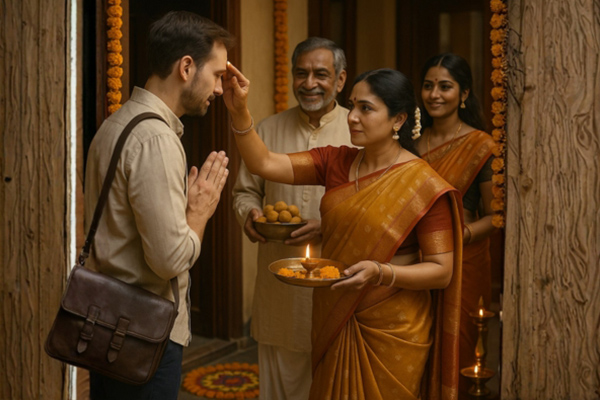
In Indian tradition, the arrival of a guest is not merely a social event but a sacred occurrence. The concept of Atithi Devo Bhava, meaning 'The guest is God,' encapsulates the profound reverence accorded to guests in Indian culture. This principle is deeply embedded in the ethos of Indian society, reflecting the values of hospitality, respect, and selflessness.
- Spiritual Significance
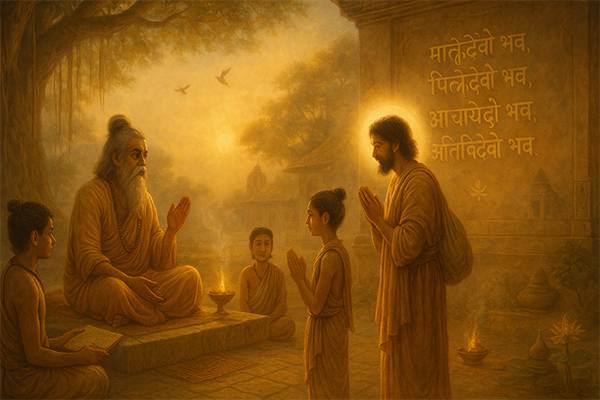
The practice of honouring guests is rooted in the Taittiriya Upanishad, which instructs:
'मातृदेवो भव, पितृदेवो भव, आचार्यदेवो भव, अतिथिदेवो भव'
'Matru Devo Bhava, Pitru Devo Bhava, Acharya Devo Bhava, Atithi Devo Bhava'
'Be one for whom the mother is God, the father is God, the teacher is God, and the guest is God.'
This verse emphasizes the importance of treating guests with the same reverence as one would offer to deities, recognizing the divine presence in every individual.
- Cultural Practices
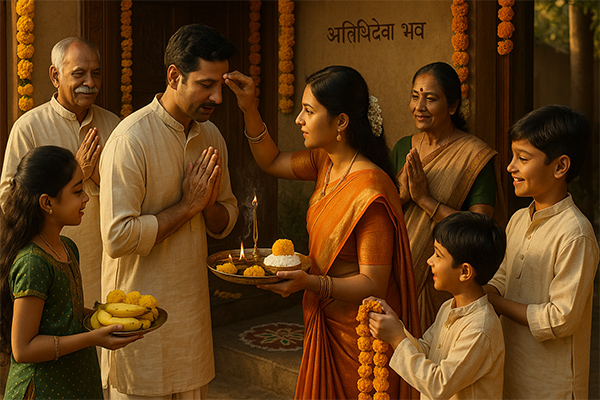
Traditional Indian hospitality involves specific rituals to honour guests:
- Dhupa (Incense): Offering a fragrant environment to please the senses.
- Diya (Lamp): Lighting a lamp symbolizes the dispelling of darkness and ignorance.
- Naivedya (Food Offering): Serving food, often sweets or fruits, as a gesture of goodwill.
- Akshata (Rice Grains): Applying a tilak with rice grains on the guest's forehead as a mark of respect.
- Pushpa (Flowers): Presenting flowers to convey purity and warmth.
These practices are not mere formalities but expressions of genuine respect and affection.
- Social Harmony
By treating guests as divine, Indian culture fosters a sense of unity and harmony. This approach transcends social hierarchies, emphasizing equality and the importance of selfless service. It encourages individuals to look beyond personal differences and extend kindness to all.
- Timeless Relevance
In contemporary times, the principle of Atithi Devo Bhava continues to influence Indian society. It serves as a reminder of the enduring values of compassion and hospitality, urging individuals to uphold these traditions in daily life.
Literal Meaning and Sanskrit Breakdown
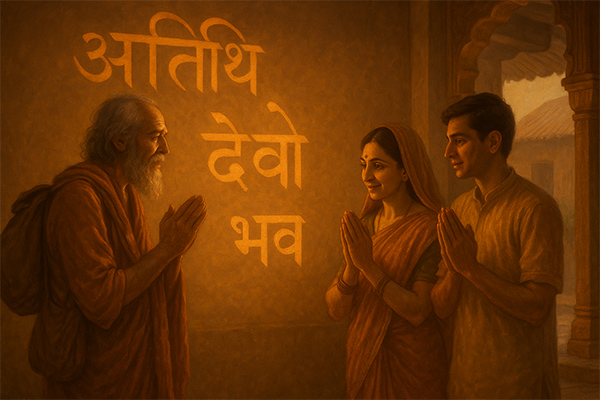
The phrase 'Atithi Devo Bhava' is a profound expression from the Sanskrit language, deeply rooted in Indian culture and spirituality. To fully appreciate its significance, let's delve into its literal meaning and linguistic components.
Etymology and Components
- Atithi (अतिथि) : This term is a compound of two Sanskrit words—'a' (अ), meaning 'without,' and 'tithi' (तिथि), meaning 'a fixed date.' Thus, 'Atithi' refers to a person who arrives without a prior appointment or fixed date, essentially, an unannounced guest.
- Devo (देवो) : Derived from 'Deva' (देव), meaning 'God' or 'divine being’.
- Bhava (भव) : A form of the verb 'bhū' (भू), which means 'to be' or 'to become.'
Combining these, 'Atithi Devo Bhava' translates to 'The guest is equivalent to God' or 'Be one for whom the guest is God.'
Scriptural Origin
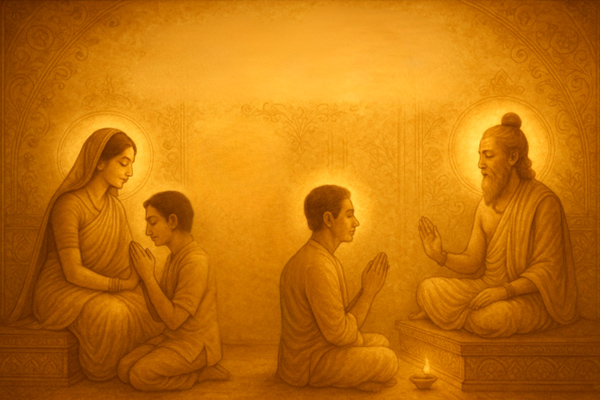
This phrase originates from the Taittiriya Upanishad, specifically the Shikshavalli I.11.2, which states:
'मातृदेवो भव, पितृदेवो भव, आचार्यदेवो भव, अतिथिदेवो भव'
Translated, it means: 'Be one for whom the mother is God, the father is God, the teacher is God, and the guest is God.'
This verse underscores the reverence and sanctity attributed to these pivotal figures in one's life, emphasizing the importance of treating guests with the utmost respect and honour.
Cultural Significance
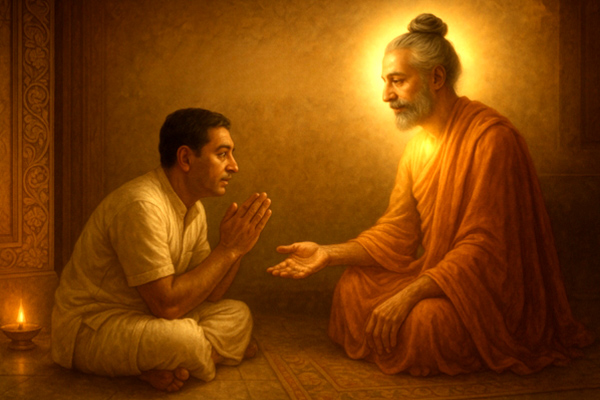
In ancient times, the arrival of a guest was considered an auspicious event, often seen as a test of the host's generosity and virtue. The unexpected nature of a guest's visit was believed to be a divine opportunity to serve and demonstrate selflessness.
This principle has been so integral to Indian ethos that it has transcended religious texts to become a societal norm, influencing practices in hospitality and interpersonal relationships across the country.
Scriptural and Vedic Origins
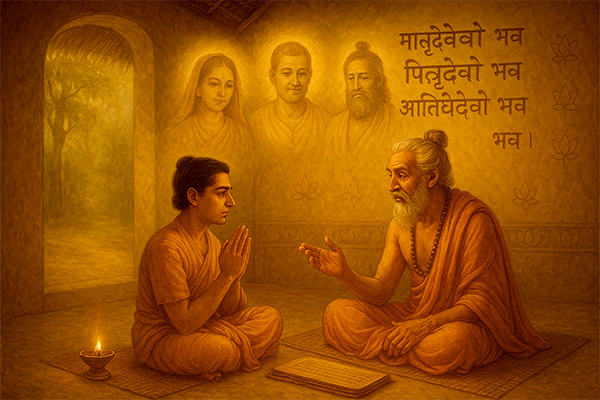
The idea of treating guests with divine reverence is not a modern invention—it is an eternal truth preserved in the Vedas and Upanishads, shaping the very foundation of Bharatiya dharma.
The phrase “Atithi Devo Bhava” is found in the Taittiriya Upanishad, one of the earliest Upanishads of the Krishna Yajurveda. In the Shikshavalli section (1.11.2), the student is instructed:
'मातृदेवो भव। पितृदेवो भव। आचार्यदेवो भव। अतिथिदेवो भव।'
(“Matru Devo Bhava, Pitru Devo Bhava, Acharya Devo Bhava, Atithi Devo Bhava”)
'Treat your mother, father, teacher, and guest as God.'
This instruction comes at the conclusion of brahmacharya (student life), when a disciple is being prepared to enter grihastha ashram (householder stage). The Rishis considered it the duty of every householder to practice humility, service, and selflessness through hospitality. A guest was seen not as a social obligation, but as an opportunity to serve the Divine in human form.
Atithi as a Test of Dharma
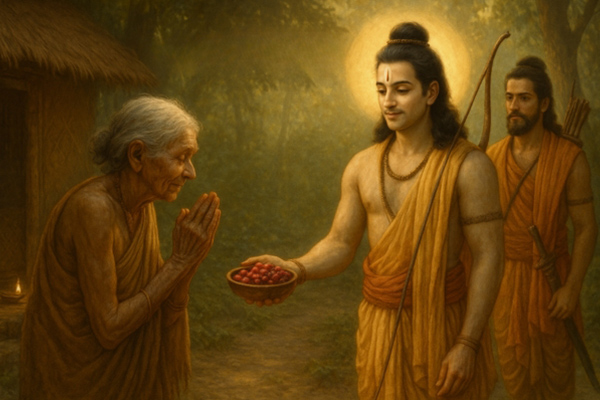
In the Mahabharata, the great sage Markandeya declares:
“An atithi who arrives unexpectedly is the visible form of Dharma.”
In the Ramayana, when Lord Rama visits Shabari’s ashram, despite her simplicity and lowly status, she receives him with such devotion and purity of heart that her hospitality becomes the turning point of her spiritual liberation.
Symbolic Meaning in Vedic Thought
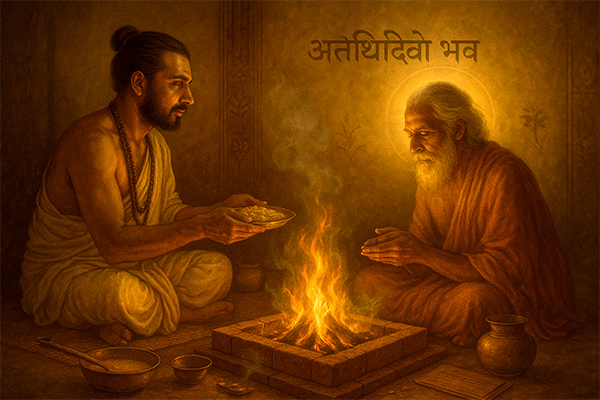
The concept of Atithi Devo Bhava also finds symbolic mention in Vedic Yajnas. In traditional fire rituals (agnihotra), guests were fed first, as their presence was seen to complete the yajna. Feeding a guest was as meritorious as offering oblations to Agni.
In this way, hospitality wasn’t limited to social courtesy, it was a spiritual offering to Ishwara.
Why Is Hospitality So Important in Hinduism?
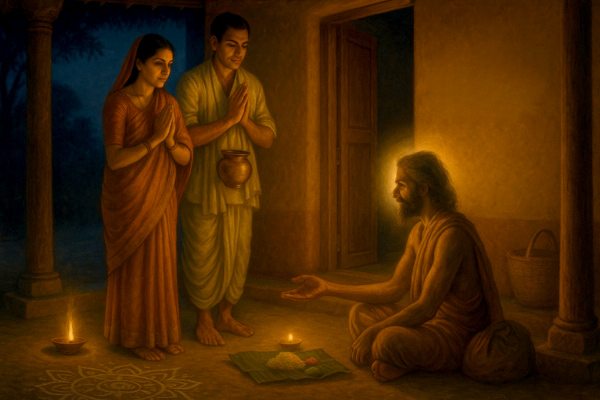
In Hinduism, hospitality is not about etiquette, it is about dharma. It is a sacred responsibility of the grihastha (householder) to offer warmth, shelter, and nourishment to any being that crosses their threshold. Why? Because in the Sanatan worldview, every soul is divine, and to serve another is to serve Ishwara.
- The Home as a Sacred Space
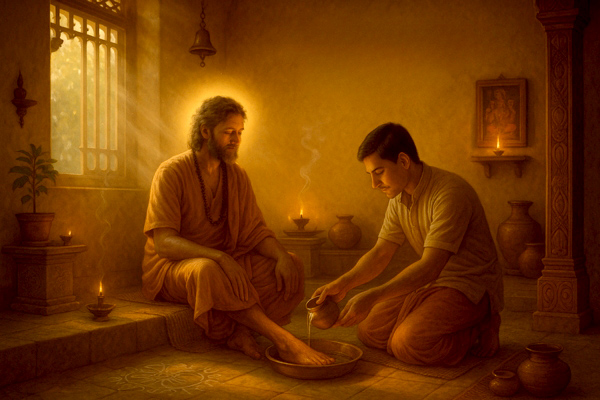
A Hindu home is considered a mandir. A place where the Divine is honoured daily through puja, prayer, and right conduct. When a guest enters the home, they are treated as an extension of that Divine presence, and the householder becomes the priest offering seva. This is why scriptures say:
“Atithir Brahma eva bhavati” – The guest is verily Brahman.
- Karma and the Law of Reciprocity
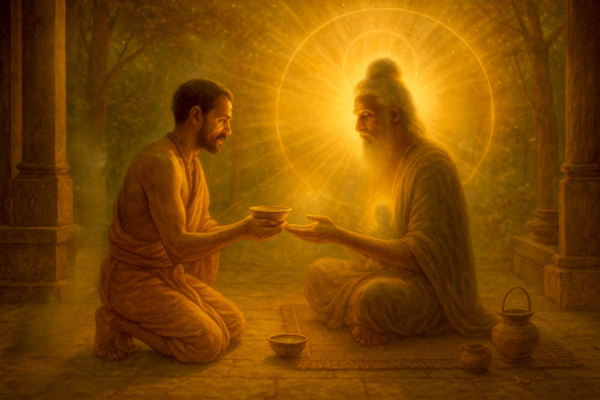
In the Vedic understanding of karma, whatever you give returns to you, not always in the same form, but in the same energy. When you offer food, safety, and respect to another without expectation, the universe reflects it back to you in unseen ways.
To serve without agenda is one of the highest expressions of satya (truthfulness), ahimsa (non-injury), and daya (compassion).
- Hospitality as Tapasya
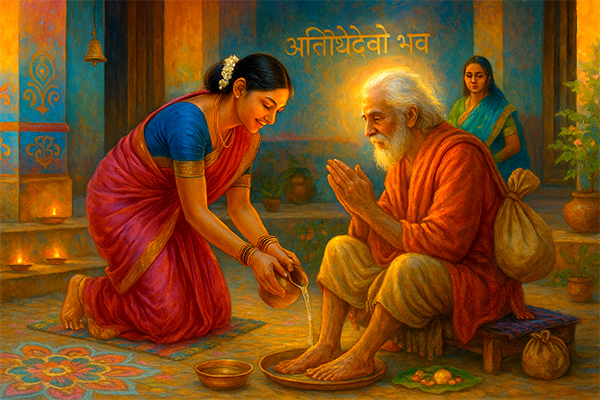
True hospitality is not always convenient. It often requires pause, humility, and surrender of ego. But that is why it is a form of tapasya (austerity). When one interrupts their own comfort to welcome a tired traveller, feed a stranger, or listen to a guest with full attention, they are practicing a kind of yajna—an inner fire sacrifice.
This is beautifully expressed in the Taittiriya Upanishad:
“Do not send the guest away disappointed. Offer him a seat, water, and food with joy.”
(Taittiriya Upanishad 1.11)
- Seva as a Path to Liberation
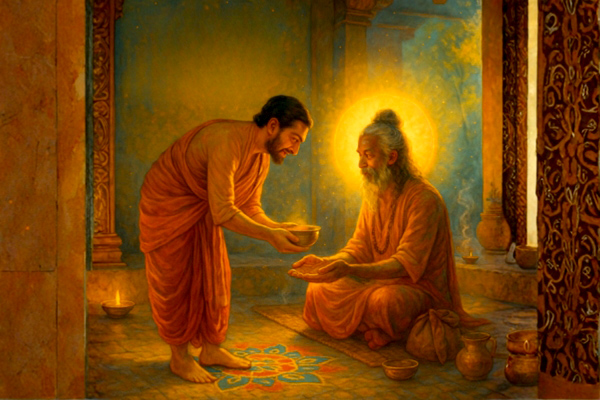
The Bhagavad Gita extols nishkama karma, action without attachment to outcome. In this light, hospitality becomes a doorway to liberation (moksha). You offer without desire, without calculation, and in doing so, you become free.
To welcome another into your home is not just to feed the body. It is to honour the soul.
In Hinduism, the guest is not a visitor, they are a reminder: that beneath all roles, names, and appearances, we are all divine hosts to each other.
Atithi Devo Bhava in Modern India

In an age of fast schedules, digital connections, and shrinking attention spans, the principle of Atithi Devo Bhava may appear like a remnant of the past. But in India, it is still very much alive—woven into both everyday hospitality and national identity.
- From Households to Hotels: A National Ethos

The Government of India adopted Atithi Devo Bhava as a key theme for its Incredible India campaign, recognizing hospitality as a spiritual and cultural pillar of the country. This initiative encouraged citizens. Especially in the tourism and service sectors, to treat every traveller as a divine guest, just as our ancestors' welcomed sages and wanderers into their homes.
This wasn’t just branding. It was a revival of dharma-based hospitality on a national scale.
- Still Practiced in Indian Homes
Despite urban life and changing dynamics, many Indian families, especially in small towns and villages, still offer water, tea, food, and kind words to any guest, even strangers. In many homes:
- Guests are served before the hosts eat
- Shoes are offered to be removed and feet washed as a mark of purity
- Aarti and tilak are performed for long-awaited or respected guests
-
Even today, offering food to a sadhu, cow, or guest is considered part of daily punya (meritorious action).
- Echoes in Festivals and Pilgrimages
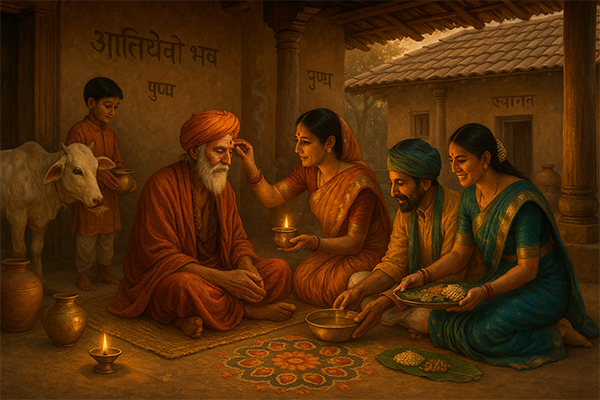
During Kumbh Mela, village yatras, or large religious events, strangers from across Bharat are fed, housed, and cared for, not with commercial interest, but with bhav (devotional feeling). The guest is not seen as a customer, but as karma in motion.
- Atithi Devo Bhava in the Heart of Indian Dharma
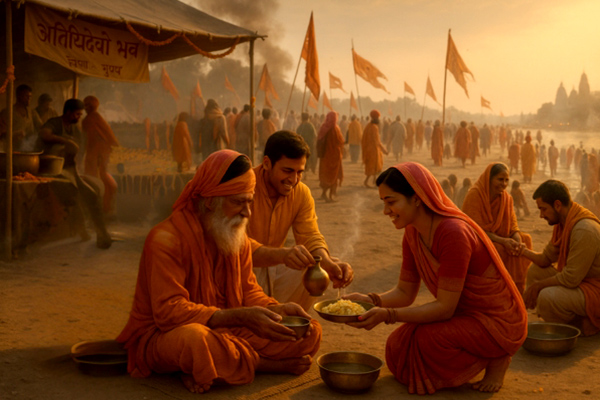
Even in the modern age, Indians continue to feel a sacred duty to offer something even if small, to those who arrive unexpectedly. A glass of water. A kind seat. A meal. A prayer.
In India, the question is not, “Do I know this person?”
It is: “What if the Divine just arrived in disguise?”
Real-Life Application of Atithi Devo Bhava

The true test of any spiritual value lies in its practice, not only in rituals, but in the everyday moments of human interaction. Atithi Devo Bhava is not reserved only for grand occasions or religious guests. It is a living dharma, one that can be expressed quietly, consistently, and meaningfully in modern life.
- At Home: Welcoming with Bhav, Not Just Objects
- A genuine smile, a glass of water, and attentive presence are the real currency of hospitality.
- Keeping a clean, energetically calm home allows guests to feel welcome not just physically, but emotionally.
- Preparing even a simple meal with devotion is considered a sacred act of seva.
- You don’t have to be wealthy to practice hospitality. You just need a willing heart.
- In Daily Life: Offering Respect to Strangers
Acknowledge service workers, delivery people, visitors, or anyone who crosses your path unexpectedly.
Make room for elders, help someone carry their bags, or offer directions with patience these are all modern extensions of Atithi Devo Bhava.
- During Festivals, Pujas, or Family Events
Invite neighbours or those who live alone. Feeding even one person with devotion invites auspiciousness into your space.
Many Indian homes still cook a portion of the meal first for a cow, bird, or guest, even if none is expected. This creates a karmic energy of openness and gratitude.
- In Professional Spaces
From hotel staff to drivers, tour guides to shopkeepers, Indian hospitality professionals who embody Atithi Devo Bhava create lasting impressions. Not because they follow rules, but because they serve from a place of pride and sincerity.
Every guest is a test of our presence, patience, and purity. To honour them is to awaken the divine host within.
How This Value Shapes Indian Society
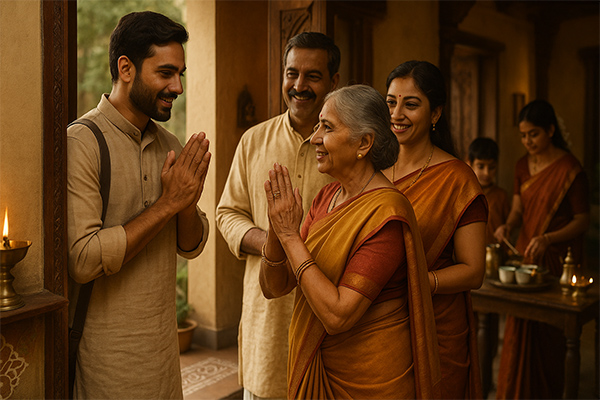
Atithi Devo Bhava is more than a household virtue; it is a value that has shaped the soul of Indian civilization. Through centuries of kingdoms, migrations, invasions, and global exchanges, what has remained consistent is the Indian tendency to welcome, absorb, and elevate.
Hospitality in India is not transactional. It is transformational, not because it changes the guest, but because it purifies the host.
- Encouraging Selflessness and Humility
At the core of Indian dharma is the idea of surrendering ego. By serving a guest, especially one who is unexpected or different from us, we practice karuna (compassion) and tyaga (renunciation of self-centeredness). This has created a society where service, not status, becomes the higher value.
- Strengthening Family and Community Bonds
In Indian villages and even urban neighbourhoods, it is common to:
- Invite passersby to a wedding meal
- Share tea with a stranger at the door
- House a distant cousin or friend of a friend without hesitation
- These acts have preserved communal harmony and emotional warmth across generations.
- Bridging Social Divides
When you see the divine in a guest, you stop asking what their caste, wealth, or title is. The gaze of Atithi Devo Bhava dissolves social hierarchies and invites unconditional giving. In temples, prasad is shared equally, and during yatras, people from all walks of life sleep under one roof and eat from the same pot.
- Shaping National Character
The Indian image in the global mind is often one of hospitality, not just warmth, but reverence. Tourists, spiritual seekers, pilgrims, and strangers are often treated with genuine care, not as outsiders but as temporary extensions of one’s own karma.
This has created a society that, despite its complexities still leans toward generosity over suspicion, faith over formality, and hospitality over hesitation.
In serving the guest, Indians do not lose themselves. They remember who they are.
Comparison with Other Cultures
The value of hospitality is a universal virtue. Across the world, cultures have honoured guests, cared for travellers, and regarded generosity as a sign of moral strength. Yet, Atithi Devo Bhava stands apart in one essential way. It makes hospitality a form of worship.
- Western Cultures: Courteous but Conditional

In many Western societies, hospitality is centred around courtesy, manners, and planning. Guests are expected to arrive by invitation and hosts often prepare in advance. Respect is given, but rarely is the guest elevated to the status of divine.
The host-guest dynamic is seen more as a social obligation or exchange of goodwill, rather than a sacred moment.
- Middle Eastern Cultures: Hospitality as Honor

Arab and Bedouin traditions emphasize honouring guests as a reflection of the host’s dignity. A guest is never turned away, even if resources are limited. This hospitality is deeply rooted in tribal and religious codes, especially in Islamic teachings, which encourage generosity and warmth toward travellers.
Here too, feeding the guest is a blessing, though not necessarily equated with worship.
- Indigenous Cultures: Communal Responsibility

In Native American, African, and tribal societies, hospitality is often a shared responsibility of the community. There is a strong sense of collective care, and guests are invited into the rhythm of daily life. This inclusiveness is spiritual, but it is more about belonging than divine reverence.
- The Uniqueness of Atithi Devo Bhava
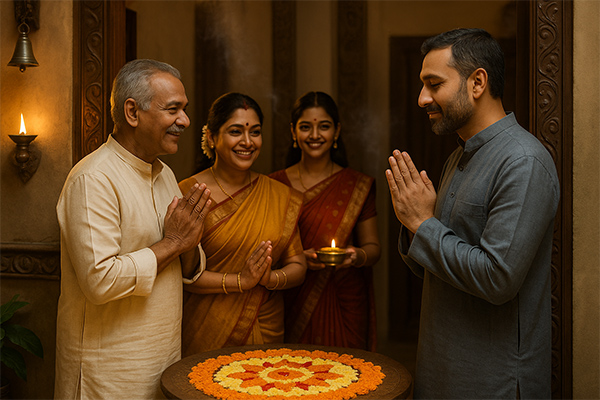
What makes the Indian ideal distinct is this: The guest is not just welcomed. The guest is seen as God.
This shifts hospitality from formality to bhakti (devotion). It aligns human behaviour with spiritual sadhana, where every encounter becomes an offering.
In many cultures, the guest is respected. In India, the guest is received as a deity, not for their benefit, but for the host’s evolution.


-in-Astrology.jpg)






.jpg)


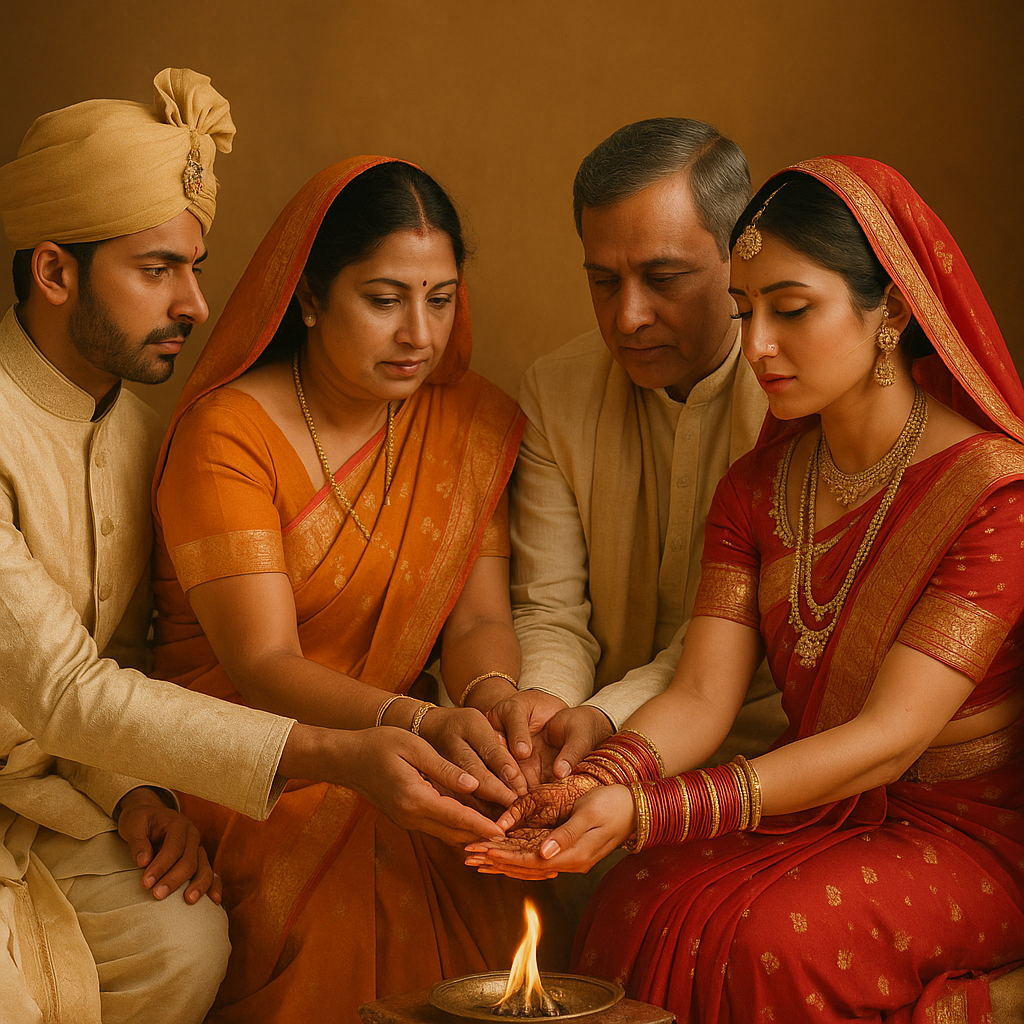
Comments 0
Leave your thought here